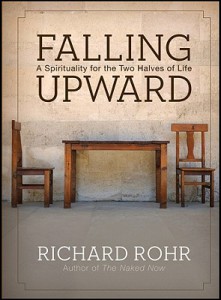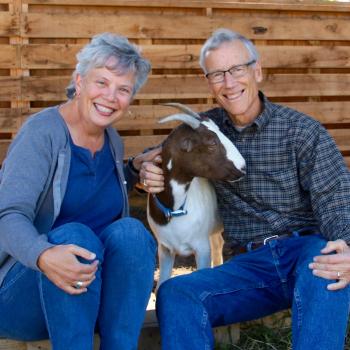 Today I’m going to run the risk of redundancy by recommending a book that’s already been recommended once on this blog: Richard Rohr’s Falling Upward: A Spirituality for the Two Halves of Life. My husband Bob raved about it before, but just in case you didn’t believe him, here’s my second to his recommendation. I’ve been slowly making my way through this text over the past few weeks and I think it’s one of the wisest books I’ve ever read about spiritual growth.
Today I’m going to run the risk of redundancy by recommending a book that’s already been recommended once on this blog: Richard Rohr’s Falling Upward: A Spirituality for the Two Halves of Life. My husband Bob raved about it before, but just in case you didn’t believe him, here’s my second to his recommendation. I’ve been slowly making my way through this text over the past few weeks and I think it’s one of the wisest books I’ve ever read about spiritual growth.
Richard Rohr is a Fransciscan priest and director of the Center for Action and Contemplation in Albuquerque, New Mexico. Falling Upward is his meditation on growing older. You can interpret the “second half of life” that he refers to in the book’s title however you wish. It might come at 30, 40, 50, 60 or even later (some people don’t get there until they’re in Hospice, Rohr writes, and some never reach it). But at some point in your life, you realize that you probably have more years behind you than ahead of you and that the tools that worked in the first half of your life aren’t adequate for the second half. And that, says Rohr, is when the spiritual journey truly begins.
Rohr writes that in the first half of life, our task is to strengthen the container that is our ego. We need to follow the rules, work hard, develop firm boundaries and see things in black-and-white. The second half of life is about filling that container, which actually exists only so that you can take the next step of finding your True Self. Far too many people, he writes, just keep doing repair work on the container itself.
His central metaphor for how to move into this next stage is “falling upward.” By that he means that the way up is the way down (don’t you just love it when spiritual teachers sound like Yoda in Star Wars?). “We grow spiritually much more by doing it wrong than by doing it right,” he writes. “That might just be the central message of how spiritual growth happens; yet nothing in us wants to believe it.” The only way to let go of our egocentric preoccupations is to come to the end of our resources, to feel as if we have failed, to be dogged by restlessness and dissatisfaction and a kind of deep homesickness for something we can’t even name. That point is when we truly begin to grow.
Second-half of life spirituality thus requires an entirely new tool kit. It means becoming comfortable with ambiguity, nuance, contradictions and paradox. We need to humble ourselves, to let go, to lose our false selves in hopes of finding our True Self. This is our deepest identity, our unique blueprint. We are given a span of years to discover it, to choose it, and to live our own destiny to the full. If we do not, our True Self will never be offered again, in our own unique form, and that is a great loss both for ourselves and for the world.
I’m fortunate to know a few people who fit the true definition of “elder.” Richard Rohr says that they are rare, but when we encounter them, we fall in love with them. I think of my 95-year-old friend Jackie, who radiates loving-kindness (“My memory is fading but that just makes it easier to live in the present,” she told Bob the other day, a broad smile on her face.) The reason why these people shine so brightly, Rohr writes, is that there is no hidden shadow self left in them.
My copy of Falling Upward is full of underlinings, which is always the sign of a good book. Let me leave you with one of my favorites:
“Most people confuse their life situation with their actual life, which is an underlying flow beneath the everyday events. This deeper discovery is largely what religious people mean by ‘finding their soul.’ … God has to undo our illusions secretly, as it were, when we are not watching and not in perfect control, say the mystics. That is perhaps why the best word for God is actually Mystery. We move forward in ways that we do not even understand and through the quiet workings of time and grace. When we get there, we are never sure just how it happened, and God does not seem to care who gets the credit, as long as our growth continues.”














